Elizabeth Ryan in Conversation with Shelley Kleyn Armistead: Part II
"It isn't just about the delicious apples or the peaches. It's got to be about the whole social, biological ecosystem."
Shelley Kleyn Armistead: Your history is something that we could write books on and never even touch the present, but moving into the present — what do you feel like the Hudson Valley looks like today? Both based on the past and in terms of its farming future?
Elizabeth Ryan: This is an interesting moment. When I came to Dutchess County in 1980, there were about 150 dairy farms down from 275 in 1972. By 2019 we were down to 16. There have been dramatic declines in local animal based agriculture, in dairy and other local commodity agriculture. There's been significant growth for small-scale, market-driven production of vegetables at the farmers markets — there were essentially no local farmers markets 40 years ago. The closing of the gap between farmers and chefs and consumers has greatly revitalized small farms. That lovely, special place that Gjelina lives in every day. Gjelina understands as much, or more than most. You get it, you're sourcing great local ingredients every day. You're touching the growers, you're bringing the best fresh produce in. So that space really didn't exist 50 years ago. A lot of Hudson Valley produce was going into the commodity food chain destined for supermarkets. Farmers were even throwing away some of their produce, if it was small or flawed in any way. When we came to the valley, many growers, if they didn't have a market for their small apples or your small pears, they got dumped behind the barn. Small potatoes, the little wonderful Grade B and Grade C, chefs started coming up here and saying to people, "You're throwing this away? I'll take them, and I'll pay you extra money for them," and, "I'll pay you extra money if you won't let the zucchini get this big, and if you'll sell it to me when it's smaller,” and, “I will pay you extra money if you'll cut it with a blossom still on it.” It represented a radical shift in consciousness. Small farmers like us, aided by small seed companies like Johnny’s, began seeking out flavorful interesting vegetables and fruits.
Green Market really was part of that, and I came to this farm — I'm sitting here at Breezy Hill, we call Breezy Hill Orchard the home farm — Breezy Hill Orchard is a founding farm of Green Market and Union Square and many, many other farmers markets. It's a 40-acre orchard with about 22 acres of fruit. Breezy Hill was already growing 40 or 50 varieties of apples when I came here, plus peaches, plums, pears, cherries and berries. This 19th century farm has survived because it had not yet been demolished for housing. It was an anachronism. So there were still Baldwins, Gravensteins, Yorks, Winesaps, Spies and Russets, and all these heirloom and historic varieties that everybody else had ripped out in favor of Red Delicious and Golden Delicious. We found markets for this great fruit.
It now seems like, “Of course, it's so obvious,” but I think people don't realize how very different it was when we were in that period where everything was packaged, food was sold in a supermarket, everything had to be sold as cheaply as possible. Most farmers weren't convinced that there were markets for “oddball” produce — we had to re-establish markets, we had to build those markets, and then we had to kind of show people that they could do wonderful things with sour cherries, for example, or rhubarb.
I remember we used to make a lot of pesto. We grew a lot of certified organic basil. I remember I had an agriculture inspector come to our farm and say, "You can't sell that. I don't get it. What is it? It's crushed up herbs and olive oil. It doesn't seem safe."
I was in a farmers market in the early days selling cheese from Jonathan White (Bobolink Dairy). He had asked us to take his cheese to market, and we were happy to do it. And his cheese is ripened with wonderful rinds. The Health Department Inspector made me take it off the table and he said to me, "That cheese is moldy.” And I said, "Yeah, people pay $20 a pound for that mold. They pay extra for that mold." So there was this gap between the kind of industrial highly packaged, sterile food system — there was a collision or clash of values between the industrial food systems and the artisanal local food system. Now there's more flexibility, a lot more understanding.
Video courtesy of Breezy Hill Orchard
Let's say that that collision... I would have guessed took about 20 years to iron out?
Yeah, yeah.
Even now — I’m making these beautiful pet-nat ciders. We're doing a lot of them. I've been doing authentic natural ciders since, probably, '97. I studied cider making in England first, and later in France. I was taught to do tight filtrations, inoculate, wild yeast was considered "bad, very bad," and you had to kill it and get rid of it, even in the early days, and then you had to sulfite it, and you had to filter the hell out of it. But I made many study trips and sought out the traditional cider makers. I was very lucky to have been mentored by Richard Sheppy and Julian Temperley, among others. We always made ciders that we called “scrumpy,” which is an English term of art. You, of all people know, what scrumpy means! So I started making a lovely farmhouse scrumpy that was really a pet-nat in many ways. It was unfiltered and unsulfited and beautiful, and had all the good stuff in it, and aromatic and just delicious. But people were afraid of it. Even restaurants didn't understand it because it wasn't predictable. It wasn't the same all the time. My distributors couldn’t handle it.
It wasn't sanitized, yeah.
It wasn't sanitized, and it was unstable. Perish the thought!
So we spend a lot of time trying to get people to be in the moment. That these are living beverages that should be enjoyed in their moment. Like a ripe pear. And this is the story of ripened cheese. This is the story of sourdough bread. This is the story of natural ciders and natural wines. I could go on and on.
It's very poignant, but I was recently at a lovely event, and they were trying to do a farm to table dinner, they had outsourced it to a caterer. And at the end of the meal, they brought out some nice desserts, and they had the ever-present big generic strawberries on them, and the big, probably Chilean, grapes. I didn't want to say anything, I didn't want to diss the caterer, if you follow me — people work so hard — but I thought, here I am and they don't even know on a certain level, I don't want to say it's insulting to me, but it is a little bit poignant. I thought, here I am, they could have done an amazing compote of fruit. We still have pears and apples. They could have done something different and interesting, but they don't have that vocabulary. And so they still are in the, I'll call it a 1950s mindset, of what do they have to present? This is one of these things that hits my hot button: why is it that people think they have to still have the big flavorless strawberry at every wedding, at every party, and that's almost this iconic thing? So we still have work to do, a lot of work.
I think that so much of that work has to be done by catering teams and chefs when you are engaging the client to not compromise. I had a very similar experience recently where somebody chose to do grilled stone fruit. But we don't have stone fruit in season, and they're not going to be in season for a while. And we weren't the caterer, but it's the point at which the caterer needs to be like, "This is what we can do. And by not doing this, you're supporting a food system that is actually damaging our planet." There's just so much better that one can do in the moment, and while you are all doing the work, we need to be your representation, human-facing, to be like that's just not the story right now in the nicest, kindest possible way through this education process. Nobody feels lesser than or smaller through their personal choices. And stone fruit are phenomenal, but not right now.
And I'll tease that point out a little bit more. So we grow a lot of stone fruit, we do a bunch of markets, and we tree ripen. Tree ripening is an incredible art and it's a challenge because peaches, I always say they're almost like bananas. They go from being too hard to past ripe very quickly depending on the temperaties, it can happen in 48 hours. Or even in 12 hours — it can happen that quickly. And so we have the luxury to pick fruit, and we're pretty fanatical about it. I have a bad habit: I always let the fruit hang too long because I want the fruit to be really good. Then we take it to New York, it's only two to three hours away, but it has to bump down there in the truck and, by the end of the day on a Saturday, we will take peaches that were perfect on Friday, and they will be so bruised and so overripe by the end of the Saturday market. So now we can talk about all this added value. We always swore we weren't gonna waste anything. We would bring that fruit home and we would turn it into a pie, make a jam, we would puree it. We used to sell peach nectar for years in the markets, but it had such a short shelf life. Even pureeing peaches and taking it back to the market, maybe you have a day. The other thing about being able to do that is flavor. Of course when you have the luxury, wherever you are, to be close to your market, whatever your market is, you can shorten that and then you don't have to make the same terrible compromises as big growers.
So that stone fruit, I'll pick on that stone fruit, which probably if they had out of season stone fruit it might have been from Chile or someplace with a completely different climate, it would have had to be picked pretty damn hard because they can't get it up here. You and I understand this phenom very well of what you have to do to get things to markets thousands of miles away. Jim Hightower, back in about 1975, wrote Hard Tomatoes, Hard Times about the decline of being able to buy good tomatoes because they had to be grown far away, hard as rocks, and shipped.
The difference now is we have this tremendous influx of people who love food, who want to be part of it. We have lost a lot of our traditional growers, but we also have a lot of legacy farm families where the kids have come home. They've come back to the fifth, sixth, seventh generation farm. I have a very particular love for that community, and respect, as you know. And we also have all kinds of folks that have a PhD from Yale or they're aspiring actors or they're creative and maybe they have a garden, maybe they have a two acre market garden. Maybe they actually want to farm, really farm, for a living. Sometimes they have capital. Capital, historically, is terribly, terribly hard for people to get in agriculture — there was a point at which Farm Credit wouldn't even loan money to organic farmers; they were considered too risky. They could lose their crops. That has changed; they will happily loan money to anybody who looks like they already have money, who looks like a good credit risk. So we have a lot of innovation and we have a lot of added value. We have an explosion of small scale or mid scale farming and innovation happening in the Hudson Valley right now. And that, to me, is incredibly fascinating.
We're starting a farmers market at the farm this year, and we have some really interesting people, some people who are shut out of the conventional farmers market because they're not always growers. So, for example, we have an amazing meat guy but he doesn't raise the meat — he sources grass fed and local, and his business is actually called Meat Things, Inc. He's doing charcuterie and whole animal, nose to tail, butchering. So we have a lot of these kinds of folks doing really special things. But I am still seeing the rising cost of property is a huge barrier for anybody who wants to farm.
I would imagine it's a double edged sword.
I feel quite excited at seeing the influx of curriculum that's now hitting different universities around agriculture, farming, and environmentalism — it's all sort of this commonality of theme coming through which is amazing, and I'm sure it's incredibly inspiring, and people can see this back to the Earth movement.
But without people like yourself, who experientially can make that transition be a long term transition rather than "finish my degree, have some access to cash, going to buy land, gonna farm, four years in, this is shit, this is hard, I have no generic like DNA wisdom, although I could develop that and therefore pass it down generationally," it really takes people like you, your community, farm hub, to make this play if it's not a generational play, like if it's not people coming back six, seven generations in, to make it actually super viable and last, and not just a trend.
So I have to tell you a funny story. There was an older founding grower. He's not at Green Market anymore. Frank Stiles, he was a pretty gruff guy, from Southern Jersey, big veg grower, and he was right across from us at Union Square. And we didn't totally click because I'm guessing that we never would vote for the same people. I think politically he was way on the other side of where I was, but we had a relationship and he was among the many farmers that mentored me and he used to come in and kind of tweak me, but every spring, we'd come back and he'd say, "Well, what did you learn last year? What happened?" And, of course, we think about that all the time. You know, was it hot? Was it cold? Did you have a big crop? Did you lose some of the crop? "What did you learn?," he used to say to me, and I would tell him. It was like a little bit of a test. He would push me.
What a great question, period.
Yeah. And then he said, "If I ever ask you that question, and you say 'nothing,' you should give up farming." He said, "I've been farming my whole life, my father farmed, but you never, you never stop learning about your farm, the crops, how they respond to the environment," and it's not a soundbite.
It's the combination of life as you're living it, and the fact that you're living with a living organism. You're living with a living, breathing organism that isn't an inanimate object that exists within four walls.
What do you think it is about your personal characteristics in addition to this, something that you love so deeply? What is it about the resilience of staying in the unpredictability of it all? Because it is unpredictable.
There are a lot of farmers that just say it's an addiction. It's an addiction, it's a positive addiction, it's an addiction to the adrenaline, and I've heard farmers describe it many different ways, but it really boils down to that same question. It's an adventure, it's a journey. And you get to see it, right? It's never about instant gratification, but it's so rewarding when you get it right, when it all clicks in, and even when it doesn't. There's a lot of folklore and jokes in the farming community about farmers and gambling and the ways you can spend your money: you can go to Vegas or you can just plant corn, right? Stories get told with a lot of juicy details. I'm not very good at telling those kinds of jokes, but they all revolve around these kinds of themes.
I think resilience is partly from who you are, it's how you're raised. Now a lot of people are not resilient in agriculture, a lot of people get depressed, they struggle. I think traditional growers feel isolated sometimes. In my family there were many people that wanted to leave the farm — they didn't see it as rewarding. When we bought this farm, my mother was very, very opposed to it. She said to me — literally one of her great quotes is, "Your grandparents worked their fingers to the bone, and I couldn't wait to get away, and your father and I've worked hard so you could go to an Ivy League university, and you are throwing it away because you could do anything, and you could be anything." And a lot of farmers, their goal is to get their kids off the farm, to get a reliable job, to get a good job.
So, I think there's been a shift, and I think that people who are farming now, my colleagues, they're like me, they're into it. They want to do it. So it's a beautiful time of reaffirmation for a lot of people, and I think you get tested every single year. Are you breaking rocks, or are you building a castle? It's not for everybody and that's okay.
If I look at European models, for example, there's much more of a reward system and support for farming in England, in France, in Holland, in Germany, financially, with access to land. It's not perfect, but also, there are these traditional agrarian extended families, or co-ops, or larger groups of people, so that it's not this American kind of, you know, the white guy and his wife and his two kids that's kind of the American way, and they are isolated out there.
Field of Dreams is still one of my favorite movies. I just love that movie. That was the guy who was losing his shirt, but he had a dollar and a dream; he didn't even have a dollar, and he manifested. That movie is about a lot of other things. But if you're a farmer and you see that movie, it's a very sweet movie.
I don't have a crystal ball. We haven't talked about climate change. Climate change is a serious concern. I'm continuing to diversify. If I had a wish list, I would wish that we all could put together a huge pool of capital and buy every goddamn farm in the Hudson Valley and repopulate them with all these wonderful people who want to farm. People are trying to do this, of course, there are programs and young farmers. And I don't think it's just about young farmers, it's farmers of all ages who want to give themselves up to this, and it's about farm retention.
The other thing that this old farmer used to say to me, and I think he meant it as a metaphor in some ways religiously, but I took it as a different kind of metaphor and it used to annoy me because I was young and cocky. He’d say, "Just remember Elizabeth, you're not in charge."
Wow.
That always hit me, and I was kind of like, "What do you mean? Is that an insult?" Did it mean that I was too arrogant, or that I should go to church more often? People say these things to you. And it is really, really, really true. On a certain level, you have to give yourself to it.
Yeah, yeah, surrender.
You have to embrace it, whether it's the weather or whether it's what you're growing, and you have to listen to it.
Or whether it's a lesson, yeah.
There is a lot of ego and, even in modern agriculture, the ego is about crushing and breaking and taming and fighting. Farming 2,500 acres and doing all this shit, adding the nitrogen, it's not very holistic, a lot of scaled American agriculture — I think that's probably the understatement of the interview, but it's not very holistic. And I have tried to understand, what are the root elements? What are the root causes of that? And I think it has to do with capital and capitalism, and the need for instant gratification. And, you know, markets.
So I have spent my life trying to break that down in the simplest way just at the level that I can handle. Maybe not in Washington, I did that for a while, but in my community, in my town, in my markets, with our employees, with the people who live and work at the farm. We have a lot of legacy.
We're building a house right now for Martin [Farm Manager] and Christina [Kitchen Manager] because they've worked here for 25 years and they need a house. And those are intangible things that can happen on these farms. It isn't just about the delicious apples or the peaches. It's got to be about the whole social, biological ecosystem.
Sure, and you've been a representation, or what you've created, being a representation of the antithesis of what we are taught as humans to chase. You know, whether I'm having this conversation with you, or whether two hours ago I'm having this conversation with a chef from Oaxaca, what one is taught to chase societally is what is sort of creating the degradation of exactly the work that you're doing and I'm hoping that more communication and more conversation around this just brings it more and more into our topics of dinner conversations, breakfast conversations, staff employee trainings, just worldwide.
And while, of course, I think that's a very grandiose statement to make, I would love this format of communicating with you, while it can't be in person in this moment, to continue because I think that the totality of who you are, in all your forms, whether it's your love of Bulgarian folk music or your love of apples, I think it all makes up the human that is prepared to take a stand and is prepared to fight for and is prepared to love so passionately and so deeply what is really the legacy that needs to be left for everybody.
I'm honored.
Breezy Hill Orchard Market Report from Elizabeth Ryan:
Strawberries have been amazing this year. I prefer the intensity of small berries over large ones. We are making strawberry scrumpy and yeast donuts filled with homemade jam. Now is the time of great abundance. Cherries are peaking. Blueberries are just coming in. We have a few amazing heirloom yellow cherries from 100-year-old trees. We just started picking plums but there will be an avalanche of plums throughout July. They are one of the most under appreciated fruits in America. Summer red and white currants are starting. And peaches are thinking about it. Two weeks and we will be rolling. So far the weather’s been good, so fingers crossed it’s not over until it’s in the basket!



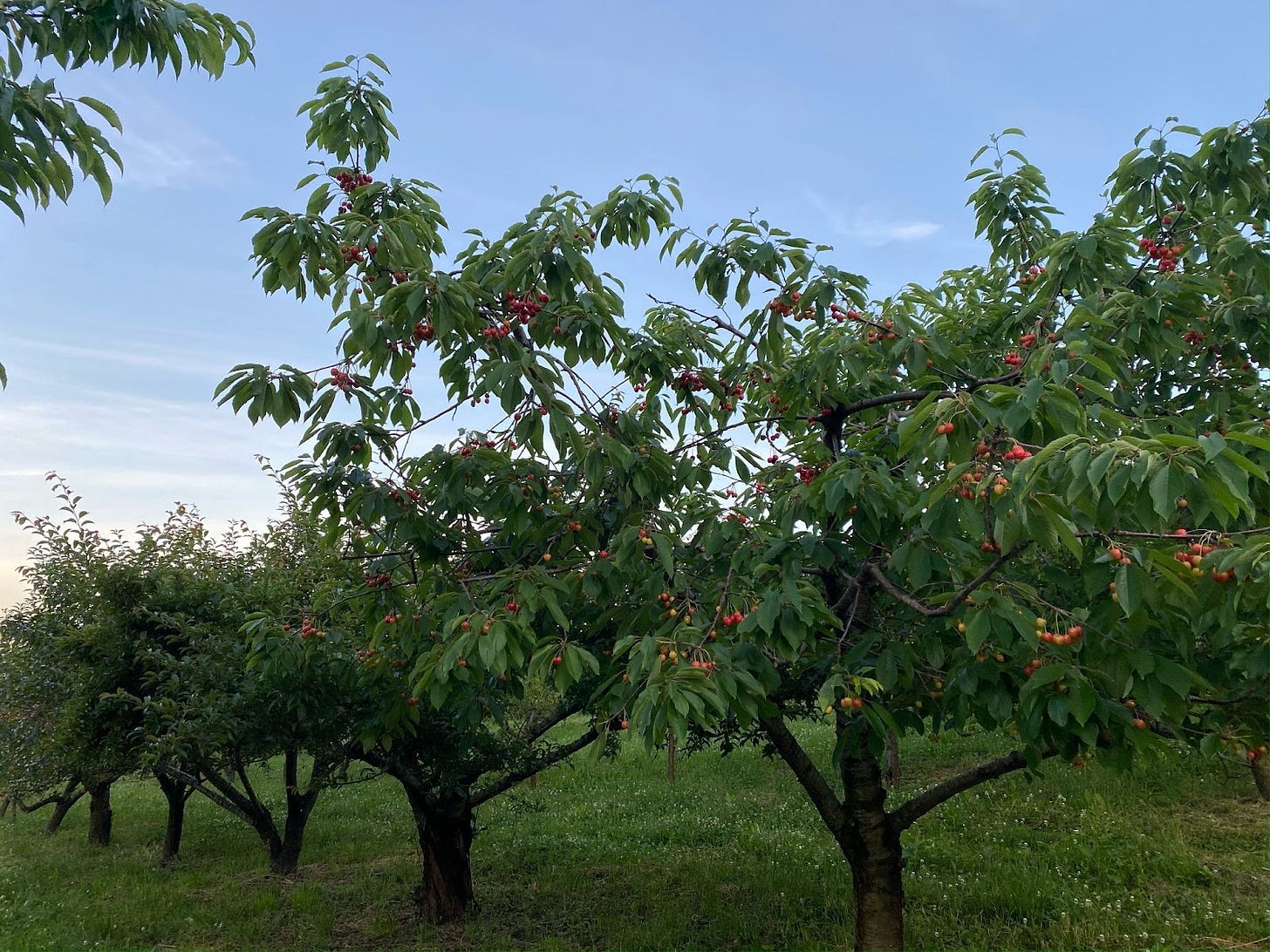

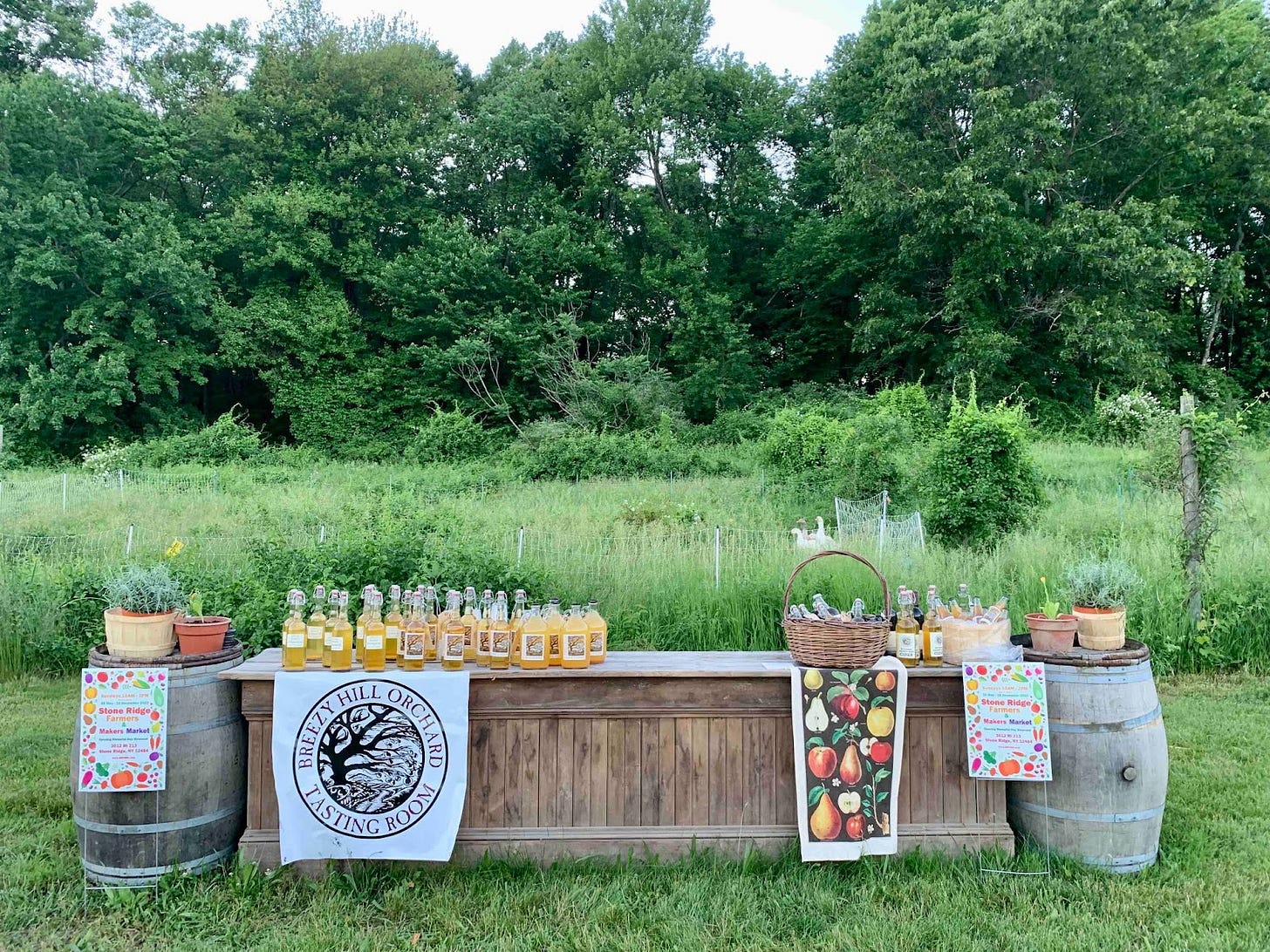
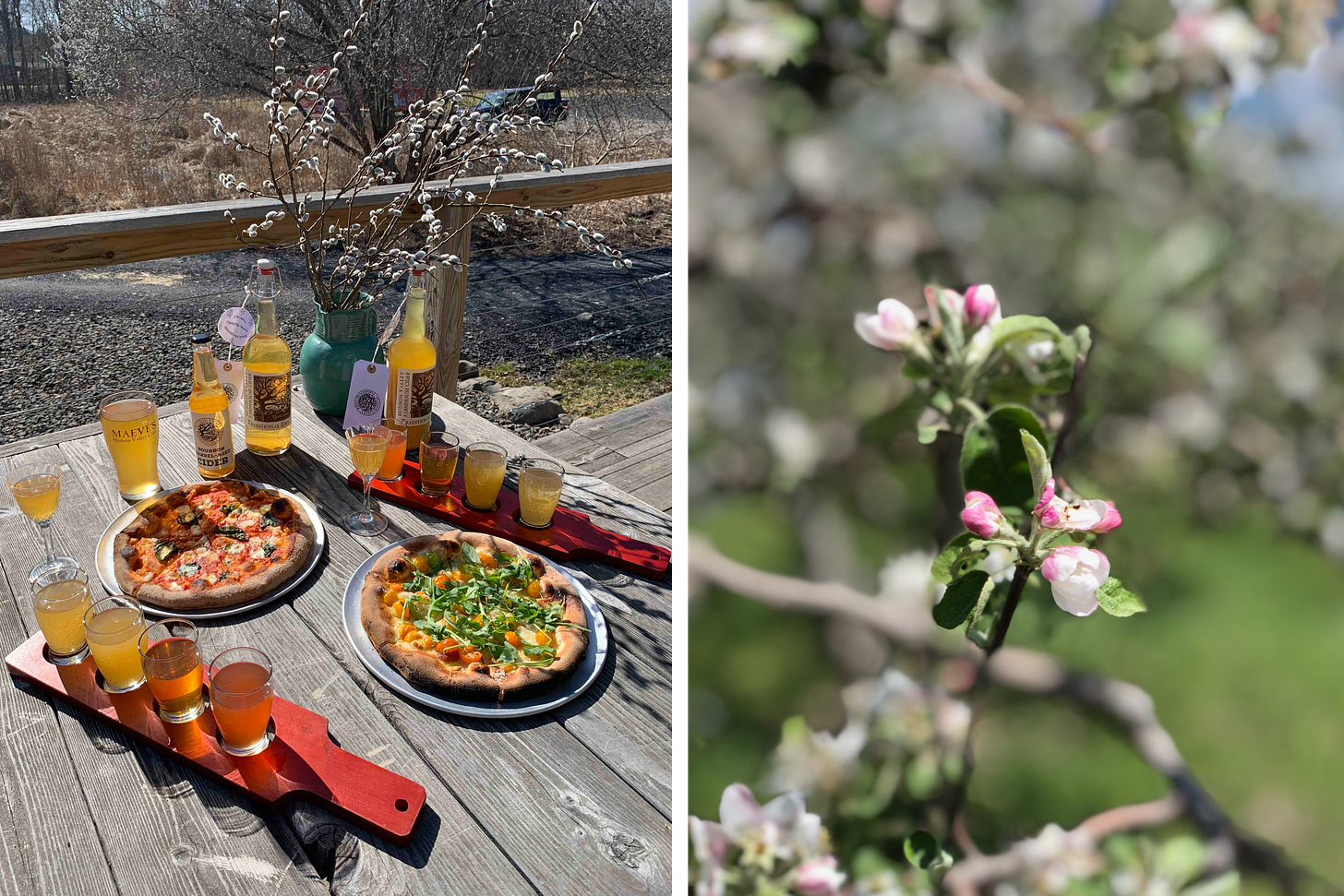
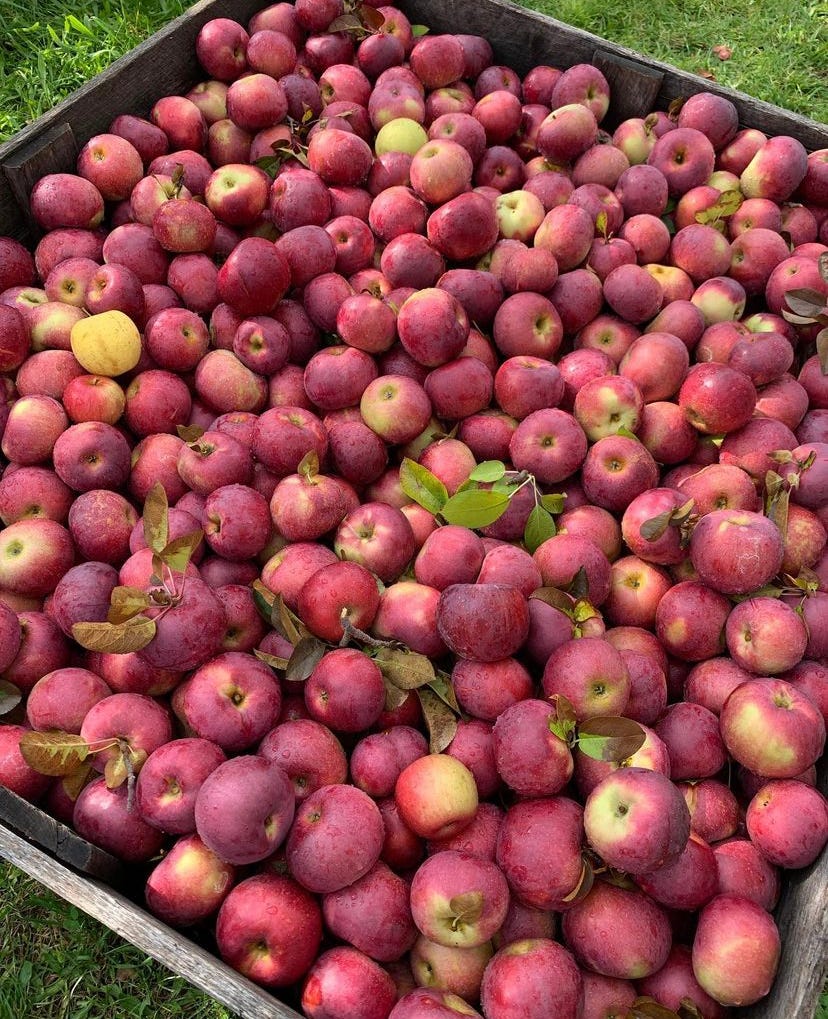





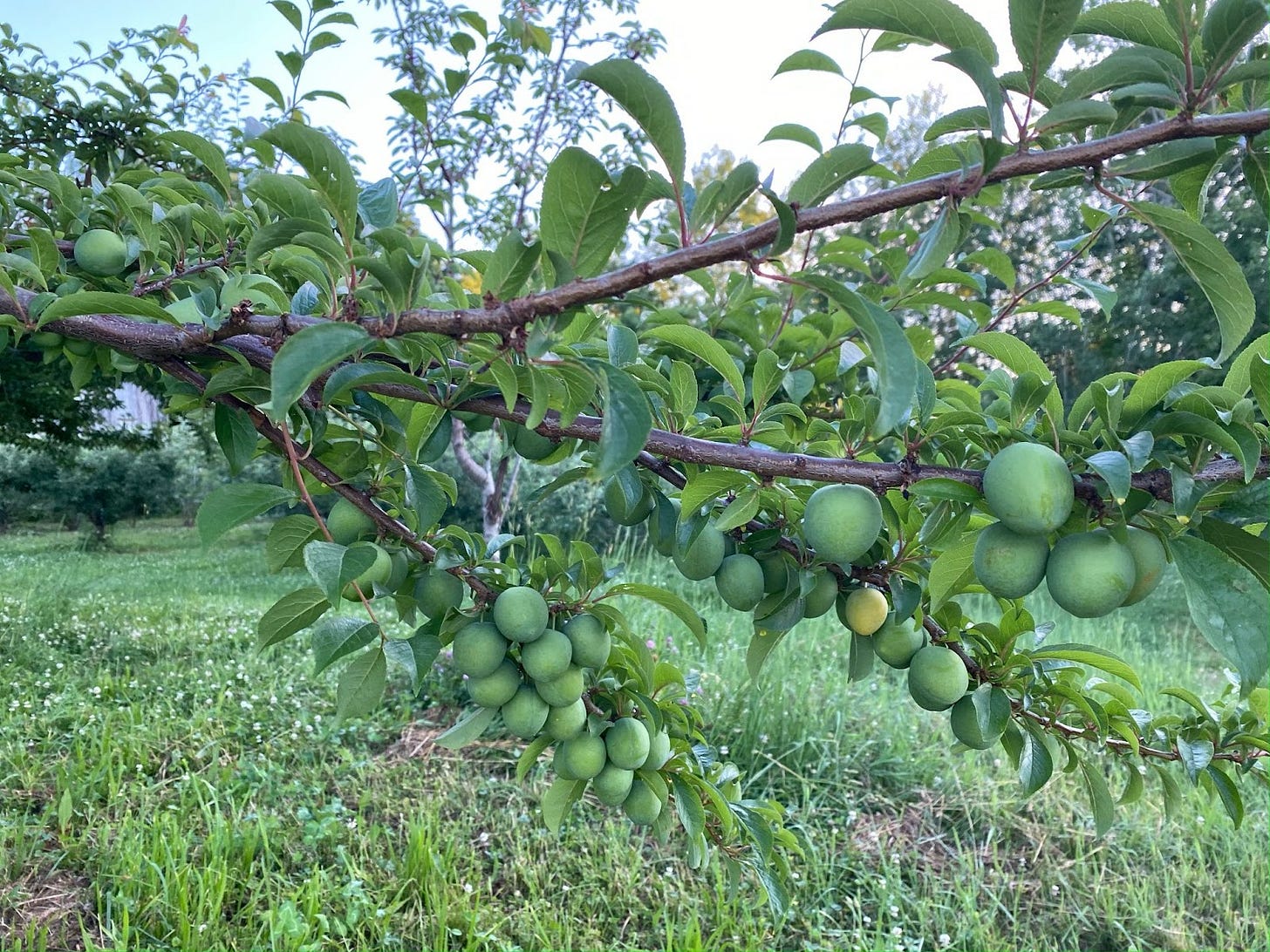

You really get a sense of Elizabeth's love, passion and gratification for her relationships with not only the bounty of her hard work but of those who are by her side to accomplish the fruits of their labor.
For those who find love in what they do, life is very fulfilling.